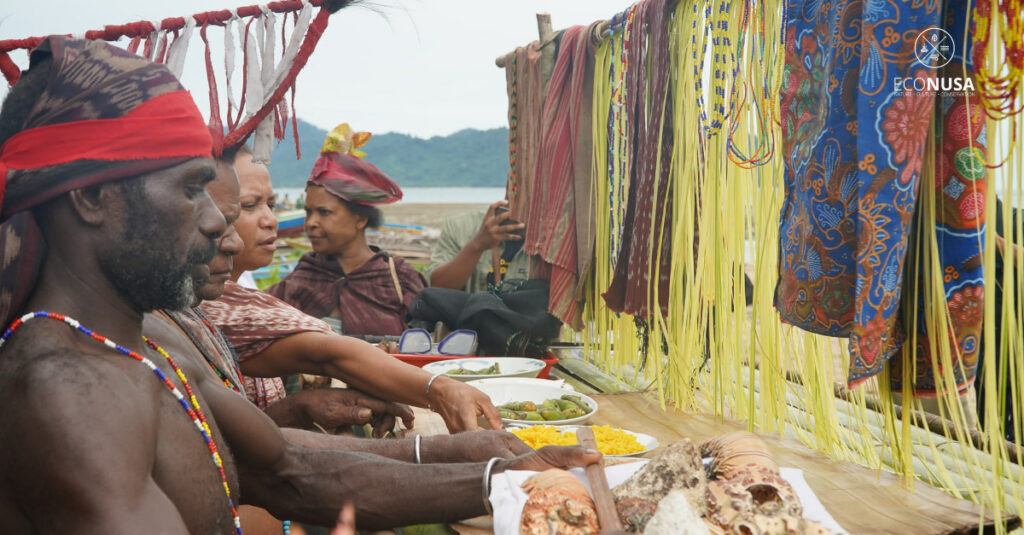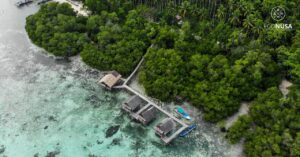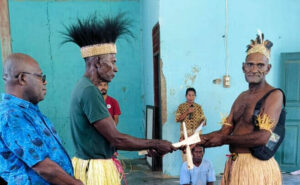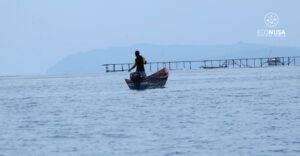
The sea was calm that morning. Under a gray sky and gentle breeze, the indigenous people of Malaumkarta Raya gathered along the shoreline. Women, men, and young people stood side by side with village elders. All were preparing to welcome a significant moment that only occurs after a long wait: the reopening of egek.
On Monday, June 23, 2025, egek was officially reopened. For the past two years, the community had protected the sea in the Malaumkarta Raya region. During that long pause, coral reefs thrived, and fish and shrimp grew large. Now, cautiously, the people reopen their sea, not to harvest as much as possible, but only to take what is needed.
“The last time it was opened was in 2023, and only for three weeks. This time, it will last at most one month,” said Jefri Mobalen, Head of Malaumkarta Village.
Also Read: Egek Festival: A Traditional Way of Moi Tribe in Preserving its Heritage and Nature
Egek is not merely a customary regulation. It is part of the Moi people’s cosmology. In the local language, egek means a prohibition or closure of a particular area from harvesting natural resources. Its purpose is to allow the ecosystem time to recover. Anyone who violates it will face traditional penalties.
This morning, the reopening of egek began with a benfi, a customary prayer ceremony to seek blessings from the sea and protection for the people. This time, benfi was led by village elders and witnessed by representatives from district and provincial governments, environmental organizations, and the indigenous community.
Paulus Sapisa, Chair of the Moi Traditional Council, stated that egek reflects collaboration between the community, government, and church. To them, the sea is not only a source of livelihood but also a unifying force. “We remain committed to protecting our forests and seas, so that their potential benefits the people and, more than that, can help build common good, such as churches,” said Paulus.
Also Read: A Travel Notes: Egek, Traditional Conservation Culture of the Moi Tribe
Previously, the proceeds from an egek reopening were used to help rebuild the village’s old church. Now, the community plans to gather funds from the sea’s bounty to construct a new church.
Luther Salamala, Assistant III of the Sorong Regency Secretariat, described egek as a form of protection rooted in local wisdom. “In today’s terms, this is like a revitalization. After harvesting, you stop. Wait until it recovers, and then you can harvest again,” he explained.
The Malaumkarta Sea is also seen as having potential to become an alternative marine tourism destination, aside from Raja Ampat. Its proximity, only about an hour from Sorong City, and its unique traditions like egek offer a distinct attraction. Notably, the egek system includes zones completely free from fishing activity, allowing ecosystems to flourish naturally.
Also Read: Retracting Egek, Looking at Moi Tribe’s Natural Deposit
“In Raja Ampat, there are zones where fishing is prohibited. The fish there have multiplied and become a tourist attraction. Now the challenge is: can Malaumkarta become like that?” said Salamala.
In a speech read by Governor’s expert staff George Yarangga, Southwest Papua Governor Elisa Kambu emphasized the importance of sustainable ocean management. “The sea is not just a food source, but also a source of livelihood, culture, and identity for the people. Through this egek moment, let’s use the sea wisely, increase the value of fishery products, promote marine industry downstreaming, and build cooperation between communities and the government,” he said.









